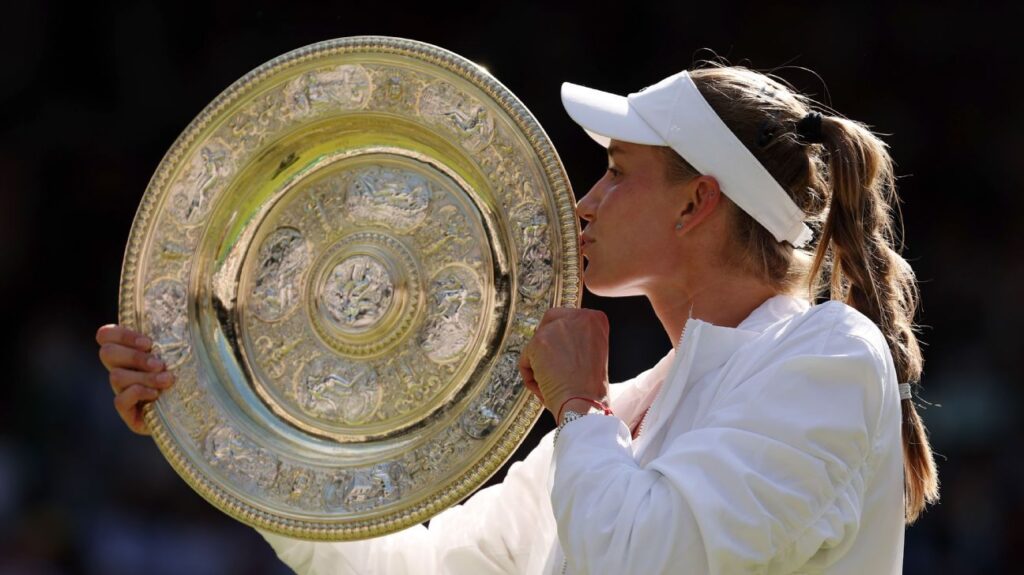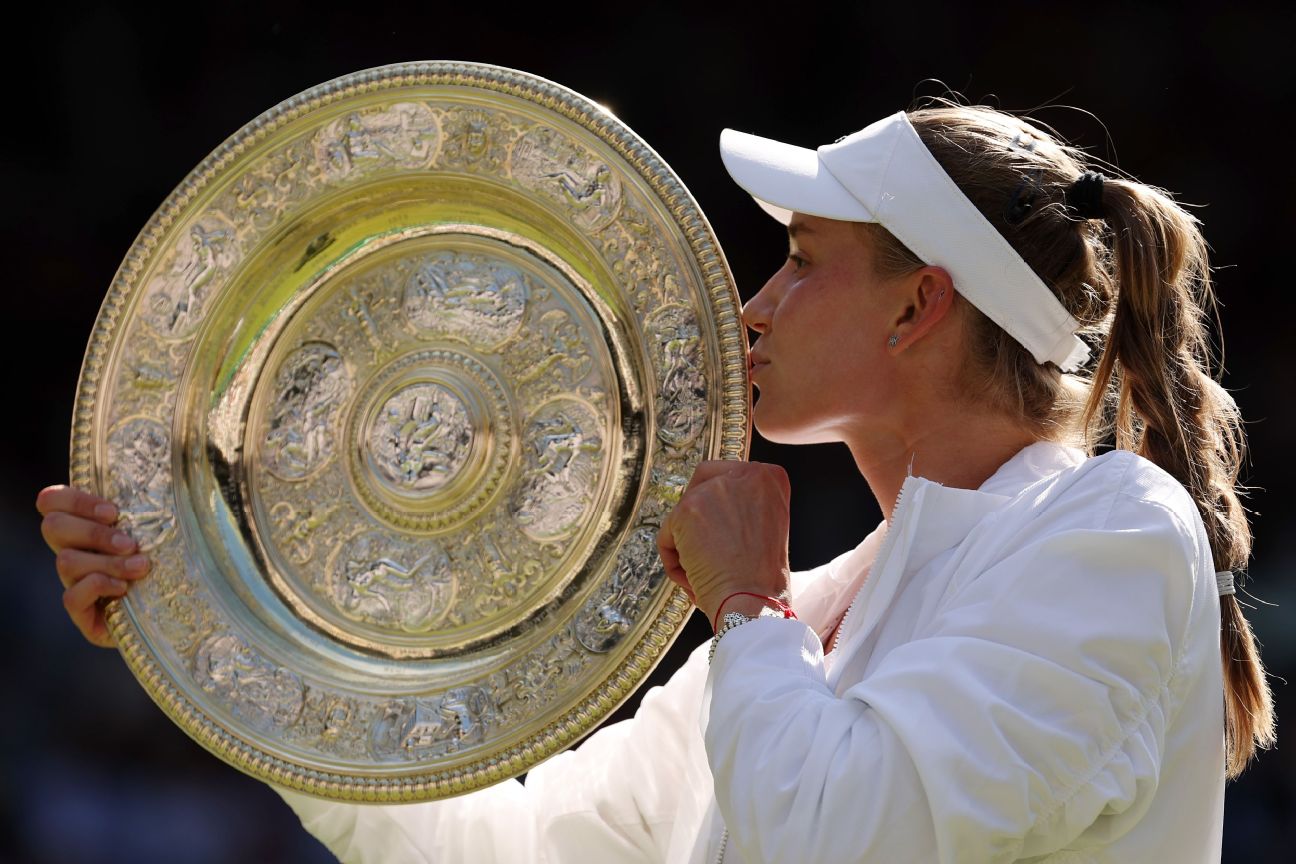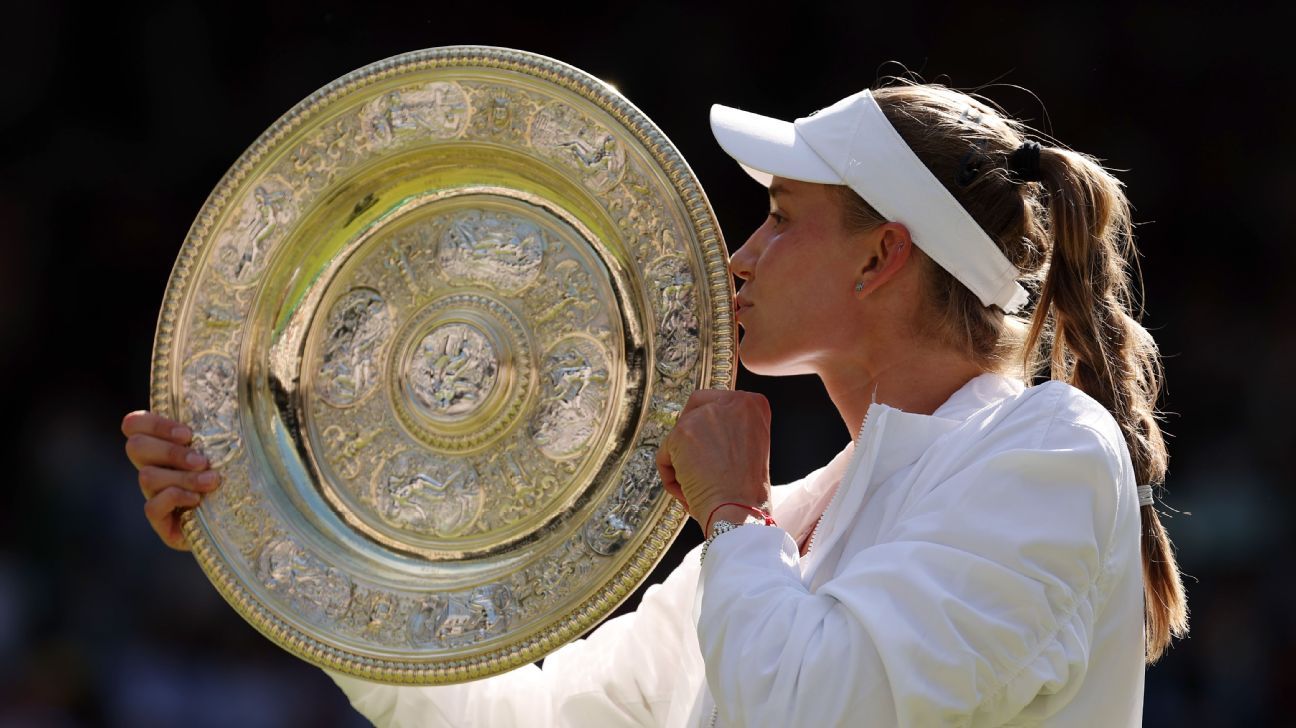Rybakina rallies for 1st Slam title at Wimbledon
After dropping the first set, Elena Rybakina regained her footing with her big serve and powerful forehand to beat Ons Jabeur…



LONDON — Too nervous to wave, Elena Rybakina stepped into the Centre Court sunshine before the Wimbledon final Saturday and kept a firm double-grip on the black-and-red straps of the racket bag slung over her shoulders.
No wave. Not much of a look around. Her play early on betrayed some jitters, too, which makes sense considering it was her debut in a Grand Slam title match.
Nearly two hours of big swinging and plenty of sprinting later, she had won the championship at the All England Club with a 3-6, 6-2, 6-2 victory over Ons Jabeur — the first singles trophy at a major tournament for her adopted country of Kazakhstan.
Even then, Rybakina’s reaction was muted as can be, a little sigh, a hint of a smile.
“Happy that it finished, to be honest,” she said, “because really, I never felt something like this.”
She added later: “I don’t know what should happen. When I was giving speech in the end I was thinking, ‘I’m going to cry right now,’ but somehow I hold it. Maybe later when I’m going to be alone in the room, I’m going to cry nonstop. I don’t know.”
Rybakina was born in Moscow and has represented Kazakhstan since 2018, when that country offered her funding to support her tennis career. The switch has been a topic of conversation during Wimbledon, because all players who represent Russia or Belarus were barred from entering the tournament because of the war in Ukraine.
Since the WTA computer rankings began in 1975, just one woman ranked lower than the No. 23 Rybakina has won Wimbledon — Venus Williams in 2007 at No. 31, although she had been No. 1 and had already won three of her five career Wimbledon trophies.
Rybakina, 23, used her big serve and powerful forehand to overcome the No. 2-ranked Jabeur’s varied style, with its mix of spins and slices, to put a halt to the 27-year-old Tunisian’s 12-match winning streak, which came entirely on grass courts.
“You have an amazing game, and I don’t think we have someone like this on tour,” Rybakina told Jabeur during the postmatch trophy ceremony, then added this one-liner: “I ran today so much, so I don’t think I need to do fitness more, honestly.”
Jabeur also was participating in her first Grand Slam final.
“She deserved this. Hopefully next time will be mine,” said Jabeur, whose exuberance on the court and personality off it have earned her the sobriquet Minister of Happiness.
“Elena stole my title,” Jabeur joked, “but it’s OK.”
Rybakina entered the fortnight with 100-1 odds to win this title, according to Caesars Sportsbook.
By the match’s third game, Jabeur was reading Rybakina’s serves and creating fewer inviting opportunities for baseline power. One squash-style forehand drew a forehand into the net to earn a break point, which Jabeur converted to lead 2-1 by putting a 120 mph serve into play then watching Rybakina sail a backhand long.
Jabeur turned toward her guest box, jumped and yelled.
Rybakina’s miscues mounted. A volley into the net tape with the full court wide open. A netted forehand after Jabeur barely got a short return in. When another forehand went awry, Jabeur broke at love to take the opening set, yelled “Yalla!” — Arabic for “Let’s go!” — and threw an uppercut as she walked to the sideline.
At that point, all momentum was with Jabeur, who was trying to become the first Arab or African woman to win a Slam singles title in the professional era, which dates to 1968.
So was history. Prior to Saturday, the winner of the first set had won the last 56 women’s major finals dating to the 2006 US Open, according to ESPN Stats & Information. Jabeur was 30-1 this season after winning the first set, with her only loss to Magda Linette at the French Open.
“I love this tournament so much. I feel really sad. But it’s tennis. There is only one winner,” Jabeur said. “I’m really happy that I’m trying to inspire many generations from my country. I hope they’re listening.”
Rybakina, who beat Serena Williams at last year’s French Open, finally earned her first break chance to begin the second set and went up 1-0 when Jabeur missed a forehand. After saving four break points over her next two service games, Rybakina broke again and soon led 5-1.
Jabeur leads the women’s tour with 13 victories in three-setters this season, but Rybakina came out far stronger in the decider.
She broke once more to begin the third, and went up 3-1.
Jabeur needed to find a way to cut down on her mistakes and came close to changing the course of things while down 3-2 in the third. She parlayed a pair of points she won via a drop shot and a lob into love-40 on Rybakina’s serve.
But Rybakina erased that trio of break points and took the game, aided by a couple of 119 mph serves.
“It is frustrating to play someone that serves really big and doesn’t give you the chance sometimes to take that break,” Jabeur said. “I just telling myself, like, ‘This is not over, I trust you.’ I even said, ‘I love you,’ to myself during the match.
“It wasn’t meant to be.”
The hold there made it 4-2, and Rybakina quickly broke again. Now she was just a game away from the biggest victory of her career — and she got to serve for it.
That game began with a 117 mph ace off Rybakina’s red racket. It ended with Jabeur missing a return.
Any apprehension, any unease, felt by Rybakina could disappear. Soon she was stepping over the green wall beside front-row seats to go through the stands for hugs with her coach, her sister and others. Her parents, however, were not on hand Saturday.
It was not until more than two hours after the match that Rybakina was overcome by the significance of it all. That moment of realization came when, during a news conference filled with questions about her lack of outward expression on court, a reporter asked what Rybakina thought her parents’ reaction would be.
She had not spoken to them yet.
“Probably,” she said, her eyes welling with tears, her face reddening, her hand placed over her mouth, “they’re going to be super proud.”
And then, after a pause, Rybakina joked: “You wanted to see emotion!”
ESPN Stats & Information and The Associated Press contributed to this report.




